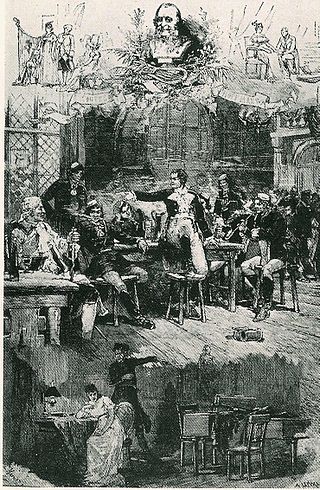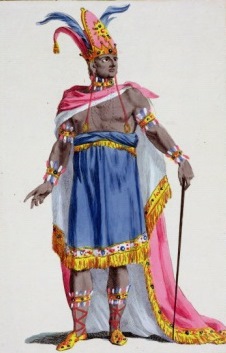
Rise and Fall of the City of Mahagonny is a political-satirical opera composed by Kurt Weill to a German libretto by Bertolt Brecht. It was first performed on 9 March 1930 at the Neues Theater in Leipzig.

Paul Muldoon is an Irish poet.

The Tales of Hoffmann is an opéra fantastique by Jacques Offenbach. The French libretto was written by Jules Barbier, based on three short stories by E. T. A. Hoffmann, who is the protagonist of the story. It was Offenbach's final work; he died in October 1880, four months before the premiere.

Der Schauspieldirektor, K. 486, is a comic singspiel by Wolfgang Amadeus Mozart, set to a German libretto by Gottlieb Stephanie, an Austrian Schauspieldirektor. Originally, it was written because of "the imperial command" of the Holy Roman Emperor Joseph II who had invited 80 guests to a private luncheon. It is regarded as "a parody on the vanity of singers", who argue over status and pay.

The Old Maid and the Thief is a radio opera in one act by Italian-American composer Gian Carlo Menotti. The work uses an English language libretto by the composer which tells a twisted tale of morals and evil womanly power. Menotti writes in the libretto "The devil couldn't do what a woman can – Make a thief out of an honest man."

Motezuma, RV 723, is an opera in three acts by Antonio Vivaldi with an Italian libretto by Alvise Giusti. The libretto is very loosely based on the life of the Aztec ruler Montezuma who died in 1520. The first performance was given in the Teatro Sant'Angelo in Venice on 14 November 1733. The music was thought to have been lost, but was discovered in 2002 in the archive of the music library of the Sing-Akademie zu Berlin. Its first fully staged performance in modern times took place in Düsseldorf, Germany, on 21 September 2005.

Daron Aric Hagen is an American composer, writer, and filmmaker.

Michael Korie is an American librettist and lyricist whose writing for musical theater and opera includes the musicals Grey Gardens and Far From Heaven, and the operas Harvey Milk and The Grapes of Wrath. His works have been produced on Broadway, Off-Broadway, and internationally. His lyrics have been nominated for the Tony Award and the Drama Desk Award, and won the Outer Critics Circle Award. In 2016, Korie was awarded the Marc Blitzstein Award from the American Academy of Arts and Letters.

Shining Brow is an English language opera by the American composer Daron Hagen, first performed by the Madison Opera in Madison, Wisconsin, April 21, 1993. The libretto is by Paul Muldoon, and is based on a treatment co-written with the composer. The story concerns events in the life of architect Frank Lloyd Wright. Hagen invited Muldoon to write the libretto while the two were both in residency at the MacDowell Colony, in Peterborough, New Hampshire during the summer of 1989.

Oberon, or The Elf-King's Oath is a 3-act romantic opera with spoken dialogue composed in 1825–26 by Carl Maria von Weber. The only English opera ever set by Weber, the libretto by James Robinson Planché was based on the German poem Oberon by Christoph Martin Wieland, which itself was based on the epic romance Huon de Bordeaux, a French medieval tale. It was premiered in London on 12 April 1826.

Bandanna is an English language opera in a prologue and two acts by Daron Hagen, first performed by the University of Texas at Austin opera theater in Austin, February 25, 1999. The libretto is by Irish poet Paul Muldoon based on a treatment co-written with the composer. It is Hagen's third opera, after Shining Brow, and Vera of Las Vegas. The story of the Venetian Moor is recast and updated to 1968 by combining elements of the original Venetian story, William Shakespeare's Othello, Giuseppe Verdi's opera Otello, and new, original characters and situations. The opera's unifying concept is the idea of the borderlines between emotional, metaphysical and moral states. The commission itself is notable for two reasons: first, it stipulated that there be no strings in the pit, second, it was financed by a consortium of over one hundred college bands from across the United States, all members of the College Band Directors National Association.

Gary Hall, also known as Shequida Hall or mononymously as Shequida, is a Jamaican-American classically trained opera singer, songwriter, playwright, and drag artist.
The Center for Contemporary Opera (CCO) is a professional opera company based in New York City, and a member of OPERA America. The company focuses on producing and developing new opera and music theater works and reviving rarely seen American operas written after the second World War. The Center for Contemporary Opera has staged the premieres of many works written during the latter half of the twentieth century. Works are performed at all stages of development from readings to workshops to full productions on the professional stage. In line with its mission to promote an interest in new operatic and music-theater culture among the American public, the company presents panel discussions and colloquia, and publishes a bi-annual newsletter Opera Today. Since 2004, the company has been a regular participant in the New York City Opera's annual festival, "Vox: Showcasing American Composers".

Griselda is a dramma per musica in three acts that was composed by Antonio Vivaldi. The opera uses a revised version of the 1701 Italian libretto by Apostolo Zeno that was based on Giovanni Boccaccio's The Decameron. The celebrated Venetian playwright Carlo Goldoni was hired to adapt the libretto for Vivaldi. The opera was first performed in Venice at the Teatro San Samuele on 18 May 1735.

Amelia is an opera in two acts by Daron Hagen to a libretto in English by Gardner McFall based on a story by Stephen Wadsworth. It had its world premiere at the Seattle Opera on 8 May 2010.

New York Stories is a trilogy of English-language one-act operas by Daron Hagen, with a libretto by Hagen and Barbara Grecki first performed in its entirety by Kentucky Opera in Louisville, Kentucky, on 30 October 2010.

The Antient Concert is a sixty-minute-long English language opera in one act by Daron Hagen with a libretto by Paul Muldoon. Hagen describes it as a "dramatic recital for four singers".

A Woman in Morocco is an English language opera in two acts composed by Daron Hagen and based on an unperformed play by Barbara Grecki. It was premiered by Kentucky Opera in Louisville, Kentucky, June 23, 2015, in a production directed by the composer. The libretto is by Hagen and Grecki, who also co-wrote the treatment. The story, set in Tangier in October 1958, concerns the disappearance of an American investigative journalist named Lizzy Holmes working on an exposé of sex trafficking. The work received a complete workshop staging at the Butler Opera Center of the Sarah and Ernest Butler School of Music at the University of Texas-Austin October 25, 2013.
Carolann Page is an American singer and actress. She is a crossover artist with credits in musical theatre, opera, chamber music and concert repertoire.











